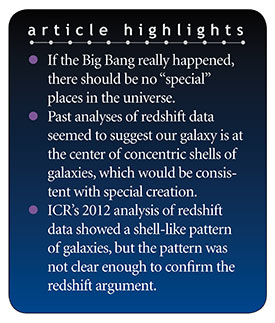 A fundamental Big Bang assumption is that there are no special places or directions in the universe. However, even observations made by Big Bang scientists call this “cosmological principle” into question.1-3
A fundamental Big Bang assumption is that there are no special places or directions in the universe. However, even observations made by Big Bang scientists call this “cosmological principle” into question.1-3
This assumption requires that neither our Milky Way galaxy nor Earth can be in any way special. According to Scripture, however, Earth is very special. God spent five days preparing Earth but only one day creating the heavenly bodies (Genesis 1:1-31). Earth is the place where the Lord Jesus Christ became a man, dwelt among us, bore our sins on the cross, and rose from the dead for our justification (Romans 4:25; 1 Corinthians 15:3-4). Given the centrality of Earth to God’s plan for the ages, it would not be surprising if it, or at least our galaxy, were located in a special place in the cosmos.
According to Scripture...Earth is very special. ![]()
For this reason, creation scientists have long been interested in observations that might confirm this. Both secular and creation scientists have claimed quantized redshift data show that the distribution of nearby galaxies is not random but that galaxies are preferentially located at discrete distances from Earth.4-7 This would imply our Milky Way galaxy is near the center of a series of spherical, concentric shells of galaxies. Because such a “chance” distribution of galaxies is extremely improbable, this phenomenon, if real, would be powerful evidence for special creation and against the Big Bang model.8
However, this is a stupendous claim, and we would prefer not to simply take published reports at face value. Unfortunately, some earlier creation studies that seemed to confirm this result failed to take into account “selection effects” that could bias the results.9 In 2012, ICR scientists began, in conjunction with other creation scientists, an effort to see if we could confirm this claim with our own analysis of the data. Although preliminary results did show an apparent series of concentric galaxy shells surrounding our Milky Way galaxy,10 this apparent pattern was not pronounced enough to rule out an illusion caused by selection effects.11
However, this may not be the final word on the issue. Our work so far has given us a much better understanding of the pitfalls in this kind of research.11-13 More data and a more sophisticated analysis might change this outcome, but for now we haven’t been able to confirm this result for ourselves.
Given the centrality of Earth to God’s plan for the ages, it would not be surprising if it, or at least our galaxy, were located in a special place in the cosmos. ![]()
So, although there are very good reasons to question the cosmological principle, we caution our fellow creationists against making strong claims regarding quantized redshifts. This intriguing possibility is definitely worth further study, but for now it seems the only evidence for it lies in the original published secular reports. Hence, it would be prudent for creationists to hold this idea loosely, viewing it as a hypothesis rather than as a confirmed result.
References
- Thomas, B. Massive Quasar Cluster Refutes Core Cosmology Principle. Creation Science Update. Posted on ICR.org January 18, 2013, accessed October 27, 2017.
- Hebert, J. A Cosmic ‘Supervoid’ vs. the Big Bang. Creation Science Update. Posted on ICR.org May 7, 2015, accessed October 27, 2017.
- Hebert, J. Giant Galaxy Ring Shouldn’t Exist. Creation Science Update. Posted on ICR.org August 24, 2015, accessed October 27, 2017.
- Redshift is the increased wavelength caused by a celestial object moving away from Earth. Some astronomers have argued that redshift data of distant galaxies show they are located in evenly spaced groups surrounding the Milky Way.
- Tifft, W. G. 1995. Redshift Quantization – A Review. Astrophysics and Space Science. 227 (1-2): 25-39.
- Hartnett, J. G. 2009. Fourier Analysis of the Large Scale Spatial Distribution of Galaxies in the Universe. In Proceedings of the 2nd Crisis in Cosmology Conference. F. Potter, ed. San Francisco: Astronomical Society of the Pacific. 413: 77-97.
- Hartnett, J. 2010. Where are we in the universe? Journal of Creation. 24 (2): 105-107.
- Humphreys, D. R. 2002. Our galaxy is the centre of the universe, ‘quantized’ redshifts show. Journal of Creation. 16 (2): 95-104.
- Selection effects result from the limitations of a data set. Because many galaxies are too dim for us to see them, we must take this into account when attempting to discern the true distribution of galaxies in our cosmic neighborhood.
- Lisle, J. 2014. ICR: “R” Is for Research. Acts & Facts. 43 (10): 14-15.
- Lisle, J. 2016. New Method to Assess the Luminosity Function of Galaxies. Answers Research Journal. 9: 67-79.
- Hebert, J. and J. Lisle. 2016. A Review of the Lynden-Bell/Choloniewski Method for Obtaining Galaxy Luminosity Functions, Part I. Creation Research Society Quarterly. 52 (3): 177-188.
- Hebert, J. and J. Lisle. 2016. A Review of the Lynden-Bell/Choloniewski Method for Obtaining Galaxy Luminosity Functions, Part II. Creation Research Society Quarterly. 52 (3): 189-199.
* Dr. Hebert is Research Associate at the Institute for Creation Research and earned his Ph.D. in physics from the University of Texas at Dallas.



















